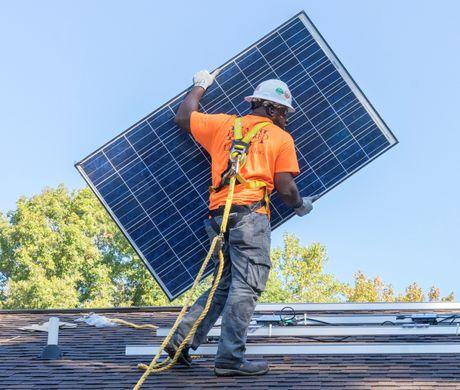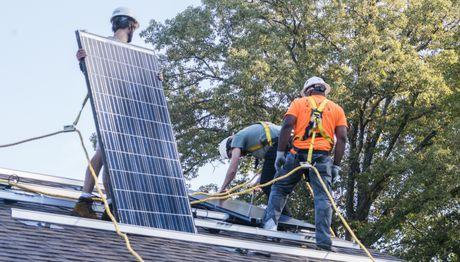Duke Energy Sponsors Solar Installations in North Carolina Habitat Homes
Installations lowers energy costs and advance workforce development
Originally posted on Duke Energy | Illumination
There have been more than 1,000 Habitat for Humanity homes built in Charlotte since 1983. Those with solar panels on the roof? Only a handful.
But with North Carolina second in the nation for solar power – only behind California – that could be changing.
Students at Central Piedmont Community College (CPCC) in Charlotte installed solar panels on 10 Habitat homes. The work was supported in part by a $32,000 grant from Duke Energy for the Renewable Energy Workforce Development Program operated by Habitat Charlotte.
Aaron Perrill, new construction project coordinator with Habitat Charlotte, said rooftop solar has been a hit for homeowners as soon as their systems are up and operating.
“They can’t say enough about it. Energy bills that were $100 are now around $60,” he said.
CPCC student Armand Erwin, who works with an electrical company, said the project satisfied his need to learn more about solar, plus helping the Habitat for Humanity cause.
“I’ve always wanted to work on a Habitat project,” he said. “Plus, my father has solar on his roof in New Jersey. This was a challenge. It was something I’d never done.”
Matt Miller, program chair at CPCC’s Sustainable Technology and Geography curriculum, has partnered with Habitat Charlotte on all 10 solar homes. He said his course, and the interest in it, have continued to grow.
“Our students are getting workforce experience they can use to apply for a job,” he said. “Plus, they’re getting to see how their skills can improve peoples’ lives. I have no problem recruiting students to this course.”
That fits in with Duke Energy's efforts. “We want to continue to grow renewable energy and support workforce development,” said Elizabeth Bennett, manager of education and outreach for Duke Energy’s distributed energy technology area. “This is one of a number of projects where we are engaging with our community and helping to develop jobs.”
In his ninth year at CPCC, Miller admits solar was scarce when he started the course.
“When we started, there was zero solar,” he said. “Now, you see rooftop solar and utility solar everywhere.”
And as more and more homes install rooftop solar, the need for a robust and reliable energy grid becomes even more pressing. This is one of the reasons why Duke Energy is investing $13 billion in the energy grid in North Carolina over the next 10 years as part of its Power Forward/Carolinas effort $25 billion across its entire service territory.
In North Carolina, there are about 6,000 rooftop solar customers. That number continues to increase.
Seeing solar on Habitat homes is picking up. Habitat organizations in California, Kentucky, Maryland and New Mexico have all recently installed solar on new homes.
Thinking about going solar on your home? Here are a few things to consider.
- Before you start a project, make sure you have cleared it with any homeowners association that may govern your neighborhood.
- In many states there are tax advantages to installing solar panels. A call to your tax professional is probably in order.
- Like any major home improvement project, do your homework. A good place to start is this consumer protection site operated by the Solar Energy Industries Association.



